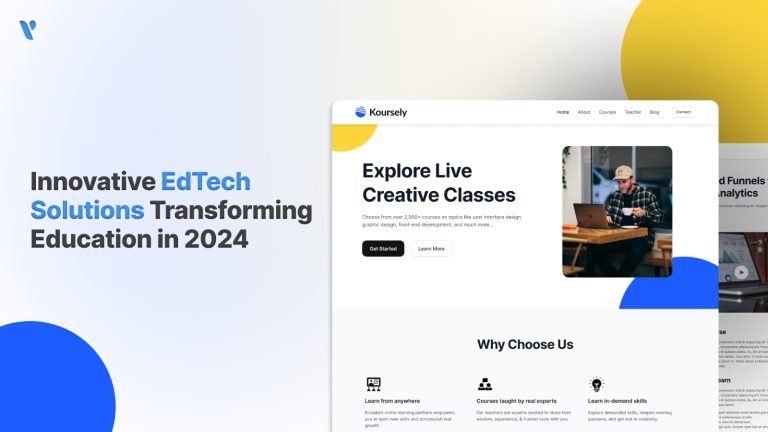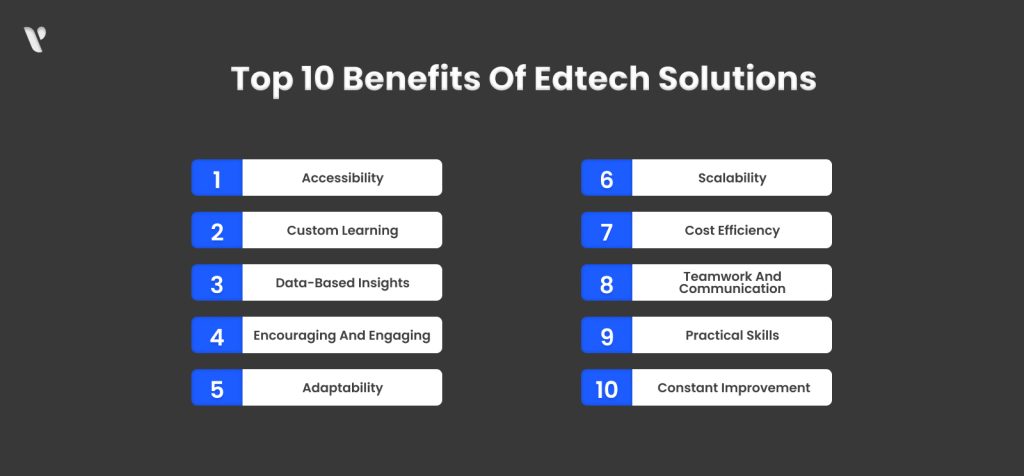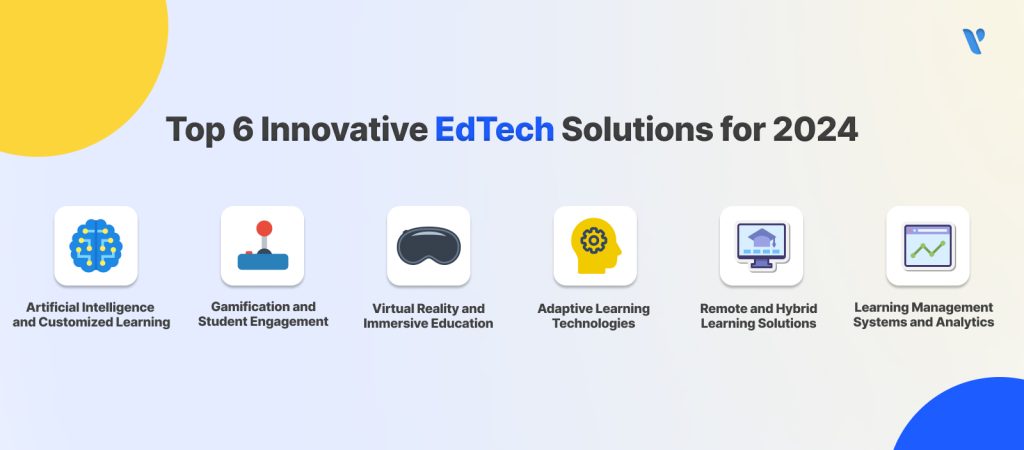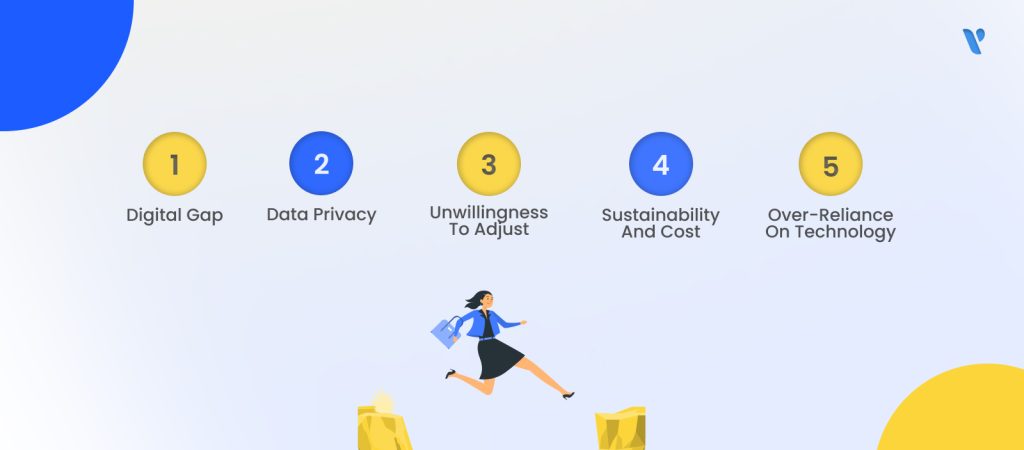Innovative EdTech Solutions: Transforming Education in 2025

Improvements in technology are causing rapid changes in education. In 2025, new EdTech solutions are not only enriching our learning process but also increasing the effectiveness, accessibility, and customization of education. These innovations are resolving years of problems and will likely change the way educators, students, and educational institutions see education.
The global e-learning market is expected to reach over $460 billion by 2026. The industry is growing rapidly, with no signs of slowing down, as more people and organizations turn to EdTech for engaging, convenient, and effective education.
This blog post highlights a few of the most innovative EdTech projects that will impact education in 2025.
Edtech, or Educational Technology, uses digital tools like computers and software to improve teaching and learning, making education more effective and engaging. The term includes everything related to computer-based education, like online lessons, small learning modules, and social learning platforms led by communities.
Edtech solutions are apps and systems that use technology for better learning and teaching. These consist of interactive digital material, instructional software, virtual classrooms, and online learning platforms. Promoting student involvement, raising the efficacy of instruction, and making education more accessible to all subject areas and grade levels are the goals.
Statistics That Tell the Story:
Fun Fact:
Over 90% of Gen Z students prefer digital textbooks over printed ones, primarily due to portability and integrated features like interactive quizzes.
Here’s a comparison of the traditional classroom setup and modern EdTech-driven solutions. This table highlights key differences in teaching methods, tools, and learning outcomes to help you understand how EdTech is transforming education:
| Feature | Traditional Classroom | EdTech Solutions |
| Teaching Style | The teacher talks; students listen and take notes. | Learning is interactive and tailored to each student. |
| Learning Tools | Books, chalkboards, and printed papers. | Laptops, apps, videos, and online courses. |
| Where You Learn | Only in a classroom at a set time. | Anywhere, anytime using a phone, tablet, or computer. |
| Personalized Learning | Same lessons for all students. | Lessons adjust to each student’s speed and ability. |
| Group Work | Face-to-face group discussions in class. | Online collaboration through tools like Zoom or Teams. |
| Tests and Feedback | Paper tests with results after a few days or weeks. | Instant quizzes and feedback using online tools. |
| Cost | Spending on books, stationery, and uniforms. | Initial device cost but lower cost for digital tools. |
| Class Size | Limited by the number of students in a room. | Unlimited; thousands can learn online together. |
| Fun Factor | Learning can feel boring without creativity. | Games, videos, and virtual experiences make it fun. |
| Support for Everyone | Limited help for students with special needs. | Accessibility features like text-to-speech and subtitles. |
| Flexibility | Fixed schedule and lessons. | Learn at your own time and speed. |
| Role of Teacher | The main source of knowledge and guidance. | Guides students while tech provides lessons and feedback. |
| Life Skills | Focus on academics like math and reading. | Adds digital skills, critical thinking, and creativity. |
| Feedback Speed | Slow; takes time to correct work. | Instant; tech tools grade and give tips right away. |
EdTech solutions are still developing in 2025 and provide a number of important benefits:

People from diverse backgrounds, especially those who live in distant or underprivileged locations, find learning to be simpler because of EdTech solutions. Economic and regional obstacles can be overcome with the use of Internet resources and platforms.
By responding to each student’s needs, talents, and limitations, artificial intelligence (AI) and advanced algorithms create customized learning experiences. This supports a range of learning speeds and styles.
Analytics technologies provide valuable insights into students’ performance and learning. With the use of this data, educators may identify areas in which pupils require help and plan lessons wisely.
Learning may be made more interesting and pleasurable with the use of interactive technologies, gamification, and multimedia material, which will increase motivation and involvement.
Students may learn at their own speed and on their own time with the help of online and hybrid learning alternatives, which can be especially helpful for working adults or those with other obligations.
EdTech solutions promote the scalability of educational programs and resources by reaching a high number of students at once, without requiring corresponding expansions in physical infrastructure.
Many EdTech solutions can reduce the need for infrastructure and physical resources, making them more affordable than traditional teaching techniques.
A more connected learning environment is promoted by tools that let students and instructors communicate and collaborate, such as virtual classrooms, discussion boards, and collaboration software.
Technology integration in the classroom contributes to the development of digital literacy and other 21st-century abilities that are essential in today’s work environment.
Technology is iterative, so tools and resources for education are always being updated and improved in response to user input and new trends.

Edtech is an industry that is always changing. Numerous trends, such as the development of educational standards, the use of augmented and virtual reality in the classroom, AI-driven adaptive learning, and smart educational technologies, are all set to profoundly alter the educational landscape.
Given how quickly the digital era is developing, this is the ideal moment to investigate edtech trends in 2025 and what they mean for education:
Imagine having a tutor available at all times who is aware of your learning preferences and can customize classes according to you. AI-powered tutors are more advanced than ever in 2025, which will make learning more efficient and effortless!
Popular Example
Khan Academy’s Khanmigo (USA) – Now used in over 200 countries, this AI tutor creates customized learning plans and helps students improve faster than traditional methods.
How It Helps:
What if learning felt like a video game? In 2025, apps use leaderboards, badges, and rewards to make studying fun and addictive.
Popular Example
Duolingo Max – The AI-powered version of Duolingo makes language learning more engaging with real-time conversation practice and interactive stories.
How It Helps:
Get rid of dull textbooks! By 2025, virtual reality headsets will enable kids to perform science experiments, explore space, and visit historical locations from the comfort of their own homes or classrooms.
Popular Example:
Meta’s Quest 3 for Education: Schools around the world use VR headsets for interactive lessons where students can explore the human body, and ancient civilizations, or even practice job skills.
How It Helps:
Ever needed help with homework late at night? In 2025, AI chatbots can explain math problems, suggest essay topics, and even help with coding in real time.
Popular Example:
ChatGPT-5 (by OpenAI) – This advanced AI tutor helps millions of students worldwide with homework, research, and language learning.
How It Helps:
Learning Management Systems (LMS) are currently used by businesses, colleges, and schools to smoothly deliver online learning, organize courses, and monitor student progress.
Popular Example:
Google Classroom & Moodle – Used by millions of educators to assign homework, track grades, and communicate with students online.
How It Helps:
Fed up with weeks of waiting for your diploma? By 2025, degrees and credentials will be digitally recorded, securely accessible, and guaranteed by blockchain technology.
Popular Example:
MIT’s Digital Diplomas (USA) – Students receive blockchain-based degrees that employers can verify instantly, reducing fraud and speeding up hiring.
How It Helps:
In 2025, classrooms will be dynamic and high-tech, with digital whiteboards, online collaboration tools, and AI-powered attendance.
Popular Example:
Microsoft Teams for Education – Now powered by AI-driven analytics, helping teachers track student progress and provide personalized learning.
How It Helps:

The following are some of the major obstacles encountered in EdTech Solutions and how to overcome them :
The technological gap is one of the main issues. Not every person has equal access to technology. It’s common for students in low-income or remote areas to lack access to dependable internet and modern technology. This gap may increase educational disparities and hamper the equitable adoption of EdTech by all students.
The growing use of digital devices demands the protection of sensitive data. EdTech platforms frequently gather personal data, which if poorly protected might be breached. For schools and parents, protecting the security and privacy of student data is a top priority.
Due to unfamiliarity or concerns about altering their standard teaching techniques, teachers and educational institutions may be reluctant to adopt new technology. Even though EdTech has the potential to improve learning outcomes, this resistance can make its implementation challenging.
It can be costly to implement EdTech solutions, especially for underfunded institutions. Another level of complexity is added by the sustainability of these technologies, which takes training, upgrades, and maintenance into account.
Technology can benefit education, but if we rely too heavily on it, we risk neglecting essential abilities like social interaction and critical thinking. To support students’ complete growth, conventional teaching techniques and EdTech use must be balanced.
Discover how YeaiTech transforms EdTech Solutions with innovative solutions—explore our success stories here:
Here’s a guide to approximate pricing for EdTech tools in 2025. Costs can vary depending on features, user base, and licensing models. This table outlines typical pricing models and examples for different types of EdTech solutions. The following figures are derived from the expertise of our software developers in developing similar apps:
| EdTech Solution | Pricing Model | Approximate Cost (2025) | Example Platforms |
| Learning Management Systems (LMS) | Subscription-based pricing per student/teacher or institutional licenses. | $5–$10 per student/month or $1,000+ annually/school | Canvas, Moodle, Blackboard |
| AI-Powered Learning Tools | Freemium (basic features free; advanced features require payment) or subscription. | $5–$20 per user/month | Duolingo (free/premium $12.99/month), Grammarly |
| Gamified Learning Platforms | Pay-per-use for classrooms or subscription for individual users. | $3–$10 per student/month | Kahoot! (free/basic premium plans start at $3) |
| Virtual Reality (VR) Learning Tools | One-time hardware costs + subscription for content access. | VR Headsets: $300–$1,500; Content: $20+/month | Meta Quest for Education, Google Expeditions |
| Collaboration Tools for Classrooms | Tiered subscription plans for individual teachers or schools. | $4–$15 per teacher/month or $2,500+ annually/school | Microsoft Teams, Google Workspace for Education |
| Microlearning Platforms | Course-based pricing or subscription plans for access to a library of courses. | $10–$40 per course or $30+/month for libraries | Coursera, LinkedIn Learning |
| AI Tutors and Chatbots | Freemium or pay-per-hour for tutoring services. | $15–$50/hour or $20–$100/month | Khan Academy (free), ScribeSense AI Tutors |
| Learning Analytics Dashboards | Per-student or institutional pricing for advanced analytics. | $3–$15 per student/month | Edsby, Schoology |
| Accessibility Tools | Pay-per-user or institutional licensing; often subsidized by grants or governments. | $5–$20 per user/month | Read&Write, ClaroRead |
| Hybrid Learning Solutions | Per-student or classroom subscription with additional costs for device integration or hardware. | $10–$30 per student/month | Zoom, Google Classroom |
| Cybersecurity Services for Schools | Flat annual licensing fee or per-user cost based on the institution’s size. | $5,000–$50,000+ annually/school | Clever, Lightspeed Systems |
Please get in touch with our team if you would like a customized app idea estimate. Our team will assess your needs as a business and as a product before presenting an elaborate cost estimate.
Imagine a future in which artificial intelligence (AI) recognizes your advantages and disadvantages, customizes your learning path, and offers personalized assistance at every stage. With YeasiTech, this future is now a reality for educators and students, not simply a distant dream.
We are your AI-enabled learning partner, dedicated to enabling both teachers and students. Our modern AI platform demonstrates the benefits of specific criticism, ongoing development, and personalized learning along with providing on-demand resources.

EdTech solutions are digital tools and technologies that help improve teaching and learning. These include software, apps, online platforms, and other resources used for education.
Customized learning experiences, more interactive material to interest viewers, easier access to a greater variety of resources, and support for different learning styles are all possible with EdTech.
By automating administrative processes, delivering real-time feedback, and customizing instruction, AI enriches education. It records progress, customizes information to each student’s requirements, and recommends resources to support them in achieving their objectives.
Popular trends include AI-driven learning, virtual and augmented reality (VR/AR), gamification, blockchain for certification, and adaptive learning powered by big data analytics.
Institutions can integrate EdTech through LMS platforms, e-learning content, mobile apps, and collaboration tools. Choosing scalable, user-friendly solutions with strong support is essential for successful implementation.
Common challenges include digital divide issues, teacher training, high initial costs, and data security concerns. Ensuring accessibility, affordability, and robust IT infrastructure is crucial for effective adoption.
Yes, from preschool to professional training, EdTech supports learners of all levels.
Gamification, multimedia content, and interactive lessons make learning more engaging and effective.
The future includes AI-driven learning, immersive VR/AR education, blockchain for certifications, and adaptive learning platforms.
YeasiTech is a trusted IT service partner with 8+ years of experience, empowering 250+ businesses with scalable web, mobile and AI solutions.
Explore related topics to broaden your understanding and gain actionable insights that can transform your strategies.